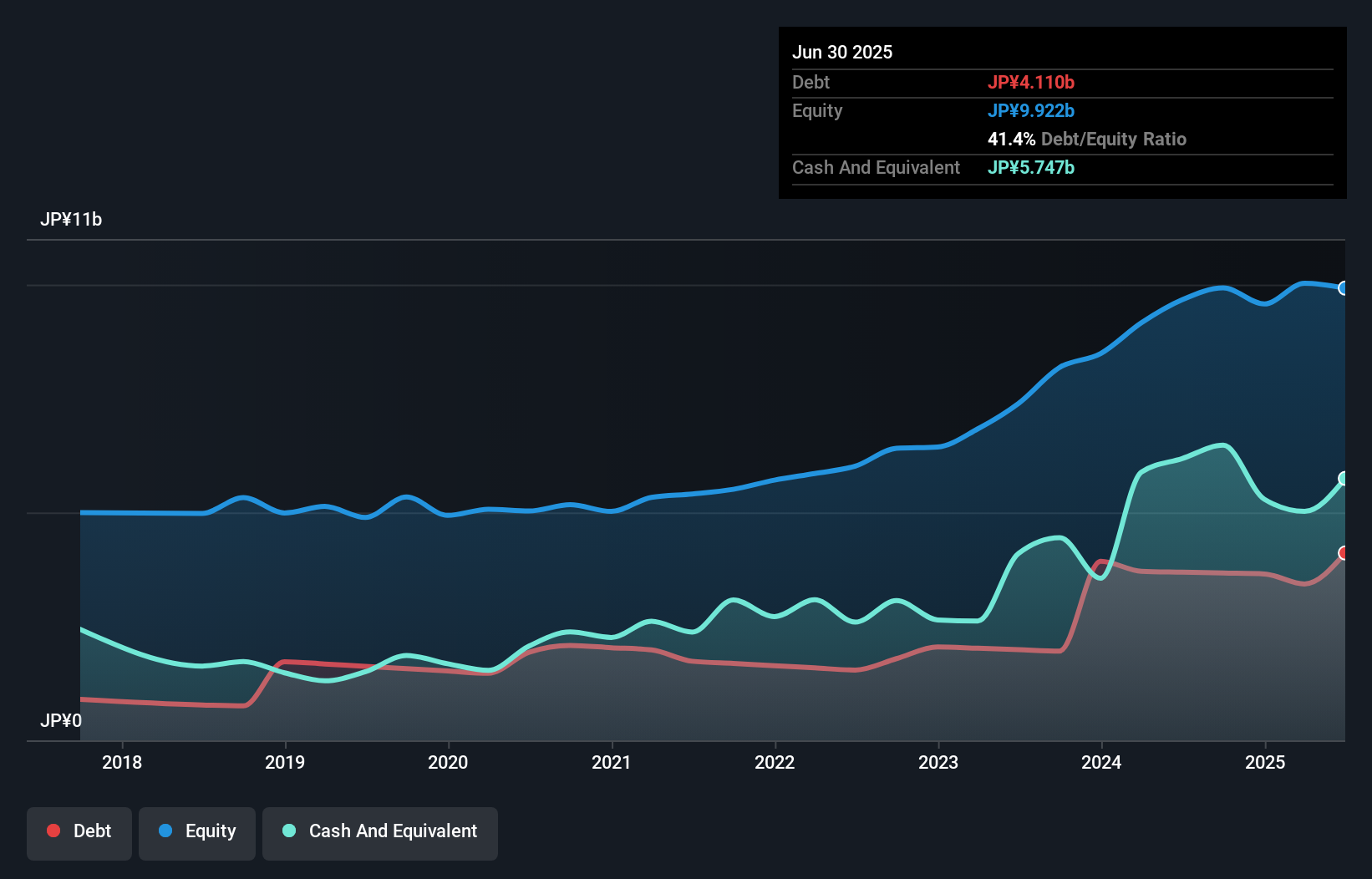Warren Buffett famously said, 'Volatility is far from synonymous with risk.' So it seems the smart money knows that debt - which is usually involved in bankruptcies - is a very important factor, when you assess how risky a company is. Importantly, Takatori Corporation (TSE:6338) does carry debt. But is this debt a concern to shareholders?
When Is Debt A Problem?
Debt assists a business until the business has trouble paying it off, either with new capital or with free cash flow. If things get really bad, the lenders can take control of the business. While that is not too common, we often do see indebted companies permanently diluting shareholders because lenders force them to raise capital at a distressed price. Of course, the upside of debt is that it often represents cheap capital, especially when it replaces dilution in a company with the ability to reinvest at high rates of return. When we examine debt levels, we first consider both cash and debt levels, together.
What Is Takatori's Debt?
You can click the graphic below for the historical numbers, but it shows that as of June 2025 Takatori had JP¥4.11b of debt, an increase on JP¥3.69b, over one year. However, its balance sheet shows it holds JP¥5.75b in cash, so it actually has JP¥1.64b net cash.

A Look At Takatori's Liabilities
According to the last reported balance sheet, Takatori had liabilities of JP¥6.32b due within 12 months, and liabilities of JP¥64.0m due beyond 12 months. Offsetting these obligations, it had cash of JP¥5.75b as well as receivables valued at JP¥1.22b due within 12 months. So it actually has JP¥586.0m more liquid assets than total liabilities.
This surplus suggests that Takatori has a conservative balance sheet, and could probably eliminate its debt without much difficulty. Simply put, the fact that Takatori has more cash than debt is arguably a good indication that it can manage its debt safely.
Check out our latest analysis for Takatori
The modesty of its debt load may become crucial for Takatori if management cannot prevent a repeat of the 73% cut to EBIT over the last year. When a company sees its earnings tank, it can sometimes find its relationships with its lenders turn sour. The balance sheet is clearly the area to focus on when you are analysing debt. But it is Takatori's earnings that will influence how the balance sheet holds up in the future. So when considering debt, it's definitely worth looking at the earnings trend. Click here for an interactive snapshot.
Finally, a business needs free cash flow to pay off debt; accounting profits just don't cut it. Takatori may have net cash on the balance sheet, but it is still interesting to look at how well the business converts its earnings before interest and tax (EBIT) to free cash flow, because that will influence both its need for, and its capacity to manage debt. Looking at the most recent three years, Takatori recorded free cash flow of 23% of its EBIT, which is weaker than we'd expect. That weak cash conversion makes it more difficult to handle indebtedness.
Summing Up
While we empathize with investors who find debt concerning, you should keep in mind that Takatori has net cash of JP¥1.64b, as well as more liquid assets than liabilities. So we are not troubled with Takatori's debt use. When analysing debt levels, the balance sheet is the obvious place to start. However, not all investment risk resides within the balance sheet - far from it. To that end, you should be aware of the 3 warning signs we've spotted with Takatori .
If you're interested in investing in businesses that can grow profits without the burden of debt, then check out this free list of growing businesses that have net cash on the balance sheet.
Valuation is complex, but we're here to simplify it.
Discover if Takatori might be undervalued or overvalued with our detailed analysis, featuring fair value estimates, potential risks, dividends, insider trades, and its financial condition.
Access Free AnalysisHave feedback on this article? Concerned about the content? Get in touch with us directly. Alternatively, email editorial-team (at) simplywallst.com.
This article by Simply Wall St is general in nature. We provide commentary based on historical data and analyst forecasts only using an unbiased methodology and our articles are not intended to be financial advice. It does not constitute a recommendation to buy or sell any stock, and does not take account of your objectives, or your financial situation. We aim to bring you long-term focused analysis driven by fundamental data. Note that our analysis may not factor in the latest price-sensitive company announcements or qualitative material. Simply Wall St has no position in any stocks mentioned.
About TSE:6338
Takatori
Manufactures and sells semiconductor and liquid crystal related equipment, multi wire saws and textile machinery, and medical devices primarily in Japan and internationally.
Adequate balance sheet with slight risk.
Market Insights
Community Narratives




